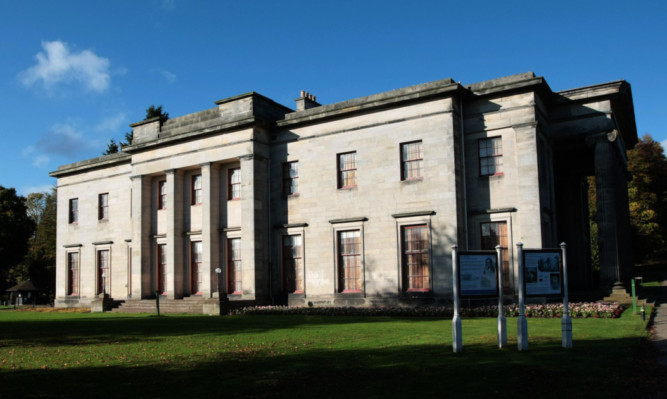Camperdown House is the “forgotten gem” of Dundee and faces a bleak future unless “someone in the city council” grasps the nettle and finds a sustainable use for the historic building, a city councillor says.
Councillor Richard McCready says the most recent report on the future of the A-listed Camperdown House “seems to be gathering dust on a shelf somewhere,” despite almost £1 million having been spent on major roof repairs three years ago.
The neo-classical mansion is one of Dundee’s glories. However, apart from the occasional large-scale event, most notably the annual Flower and Food Festival, the stately home remains closed to the public.
Mr McCready, formerly convener of the city council’s arts and leisure department, says part of the problem now is that no one department seems to be interested in taking responsibility for promoting the building.
He said: “It’s a crying shame that it’s closed nearly all the time and only opens for the Food and Flower Festival. A lot of people do express interest in Camperdown House when they see it being used for that.
“It’s not controlled by Leisure and Culture Dundee and the environment department don’t have an agenda for it, neither does city development, so it falls between three stools.
“I think there is scope for the possible use of it as a restaurant/caf or a hotel of some sort. I’d like to see if there is any kind of private use for it but also if the public could be given access to the artworks and the exhibits.
“Something must be done about it because there was a lot of money spent on roof repairs recently and the public are having to pay for the continuing maintenance of a building that’s empty most of the year. It needs someone to grasp the nettle and take it forward.”
Mr McCready’s comments mirrored those of Dundee woman Jillian Smith who was at the Flower and Food Festival and saw various floral displays there.
She said: “It was lovely but I know it’s normally closed to the public and I wondered if there are any plans to reopen it?”
Dundee City Council published a report two years ago, which stated that talks have been held in the past about the use of the building as a privately-run boutique hotel.
The report acknowledged that there are a number of “heritage-related, legal, political and commercial issues” which would need to be addressed before a private venture at this “sensitive location” could be progressed.
It states the park is controlled by the terms of the Confirmation Act which maintains rights to public access and restricts private control of land and buildings there.
“It is felt to be unlikely that Dundee City Council would become the operator of a hotel at Camperdown House and therefore a private development appears to be the most likely way of securing its rehabilitation,” states the report.
Among the other recommendations made are that a feasibility study should be commissioned to identify and prioritise the options for the use of Camperdown House and carry out an economic/commercial appraisal for a public/private venture.
A council spokesman said: “The council is currently reviewing the future of Camperdown House, with the view to bringing it back into use.”A historic building searching for a modern useCamperdown House is regarded as one of the finest neoclassical homes in Britain.
It was commissioned by Admiral Duncan’s son and heir, Robert Dundas, 2nd Viscount Duncan of Camperdown, and was constructed between 1824 to 1828.
Dundas was created an Earl by William IV and the house would remain the family seat for three generations, until the fourth earl died childless in 1933.
The last occupant of the house was Georgiana Wilhelmina, Dowager Countess of Buckinghamshire, who died in 1937.
The house contents were sold in an auction in 1941, while the house and estate were purchased by Dundee in 1946.
In 1996, following the release of a collection of historical items relating to the life and times of Admiral Duncan, Dundee City Council and the National Galleries of Scotland signed a partnership agreement to develop the house.
Building on the enthusiasm for the bicentenary celebrations of the Battle of Camperdown in 1997, Dundee City Council applied for and received money from the National Heritage Lottery Fund to fund a major conservation plan and study of the house.
That study concluded Camperdown House had enormous potential for being adapted as a historic house, particularly with the full display of Duncan family possessions and Camperdown memorabilia.
The house was last opened to the public on a regular basis in 2003 when it contained a cafeteria, function rooms and displays relating to Admiral Duncan and the Battle of Camperdown but this arrangement proved unsustainable and since then the house has been open only for special events.
A variety of proposals have been put forward for the house, including converting it into a boutique hotel or restaurant.
